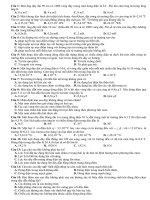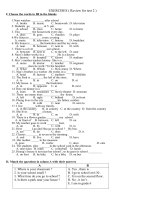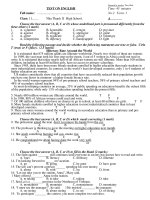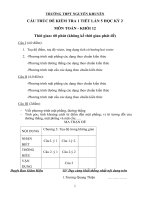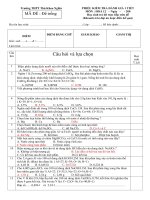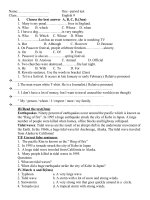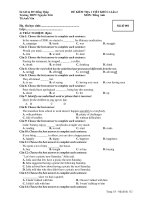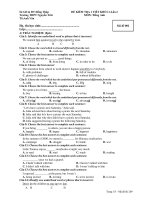Đề kiểm tra 45'''' tiếng Anh 11 lần 2- học kỳ 2
Bạn đang xem bản rút gọn của tài liệu. Xem và tải ngay bản đầy đủ của tài liệu tại đây (98.67 KB, 2 trang )
SỞ GD - ĐT BẮC GIANG
TRƯỜNG THPT TÂN YÊN SỐ 2
Đề Kiểm Tra 45’ lần 4
Môn: Tiếng Anh Khối 11
Name:
Class:
I. Choose the word whose underlined part differs from the others. (1pt)
1. A. talked B. painted C. asked D. liked
2. A. worked B. stopped C. forced D. wanted
3. A. widens B. referees C. sacks D. cancels
4. A. tombs B. lamps C. brakes D. invites
5. A. learned B. watched C. helped D. wicked
II. Choose the best answer (2pt)
1. The Vietnamese participants always take part ______ sports events with great enthusiasm.
a. in b. on c. at d. to
2. New sports and traditional sports have been added ______ the Games.
a. in b. on c. up d. to
3. Scuba-diving and windsurfing are both aquatic sports.
a. field b. water c. combat d. individual
4. Their efforts were much ______ when they won 2 gold, medals in bodybuilding and billiards.
a. considered b. required c. expended d. appreciated
5. My father never indulges drinking.
A. on B. in C. with D. to
6. My friend Dave was really interested in my best stamp, so I it away to him.
A. gave B. threw C. brought D. put
7. who was elected the first woman mayor of Chicago in 1979.
A. It was Jane Byrne B. Jane Byrne
C. That Jane Byrne D. When Jane Byrne
8. It was in 1875 joined the staff of the astronomical observatory at Harvard University.
A. that Anna Winlock B. Anna Winlock, who
C. as Anna Winlock D. Anna Winlock then
9. that the capital of South Carolina was moved from Charleston to ColumbiA.
A. In 1790 was B. There was in 1790
C. In 1790 D. It was in 1790
10. It was Mr. Harding the bill to yesterday.
A. who sent my secretary B. to whom my secretary sent
C. that my secretary sent D. my secretary sent
III. Tick (√) the sentences in which relative pronouns can be omitted. (1pt)
Example:
√
Is this the car that the police are looking for?
___1. Everything that happened was my fault.
___2. Is there anything that I can do?
___3. The window that was broken has now been repaired.
___4. Where are the eggs that were in the fridge?
___5. The play that we saw last week was boring.
___6. The young man who I sat next to on the bus talked all the time.
___7. Do you know the girl who Tom is talking to?
___8. Linda works for a company that makes computers.
___9. The book about the young girl who runs away from home.
___10. He is getting on well with Mary, who he met last month.
IV. Rewrite the following sentences (4pts)
Using Cleft sentences “It is/was…that…”
1.The boy visited his uncle last month.
@ ……………………………………………………………………………
2. The man is learning English.
@ ……………………………………………………………………………
3. The woman gave him the book
@ ……………………………………………………………………………
4. She bought that present from the shop.
@ ……………………………………………………………………………
Combining the sentences by omitting relative pronouns.
5. The house is not in good condition. We are living in it.
@ ……………………………………………………………………………
6.I w as not interested in the things .They were talking about them.
@ ……………………………………………………………………………
7. He did not get the job .He applied for it.
@ ……………………………………………………………………………
8. The bed was very modern. I slept in it.
@ ……………………………………………………………………………
9.The girl is from Britain . We are going to see her.
@ ……………………………………………………………………………
10. The play was boring. we saw it last week.
@ ……………………………………………………………………………
V. Read the passage and answer the questions that follow (2pts)
Cooking
Cooking requires applying heat to a food which usually, though not always,
chemically transforms it, thus changing its flavor, texture, appearance, and nutritional
properties. It encompasses a vast range of methods and tools, and may also be used to
improve the digestibility of food. It may require the selection, measurement and
combining of ingredients in an ordered procedure in an effort to achieve the desired
result. Constraints on success include the ambient conditions, tools and the skill of the
individual cook.
The diversity of cooking worldwide reveals the myriad of nutritional, aesthetic,
agricultural, agronomic, economic, cultural and religious considerations that have an
impact upon it. Cooking properly, as opposed to roasting, requires the boiling of water or
oil in a receptacle, and was practiced at least since the 10th millennium BC with the
introduction of pottery. There is archaeological evidence of roasted foodstuffs, both
animal and vegetable, in human (Homo erectus) camp sites dating from the earliest
known use of fire some 800,000 years ago.
1. Does cooking require heat?
…………………………………………………………………………………………
2. What did cooking date from?
…………………………………………………………………………………………
3. What does the diversity of cooking worldwide reveal?
…………………………………………………………………………………………
4. Does roasting need the boiling of water or oil in receptacle?
…………………………………………………………………………………………
